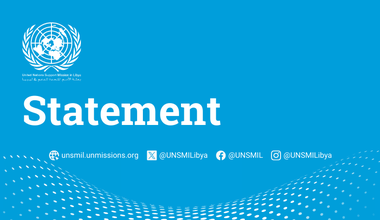Economic Working Group Co-Chairs Call for a Libyan Negotiated Solution that Addresses the Deepening Economic Crisis
On 1 December, Economic Working Group (EWG) co-chairs of the International Follow Up Committee for Libya, including Ambassadors of Egypt and the United States, the European Union, and the Acting Special Representative of the Secretary-General Stephanie Williams, as well as representatives of the Libyan Economic Experts Commission, met to discuss the deepening economic crisis. Participants agreed that the Libyan people should have confidence that oil and gas revenues are managed transparently and in the public interest, and any actors who would seek to undermine that confidence should be held accountable. A new consensus arrangement is therefore needed to set Libya on the path toward political stability, economic recovery, and collective prosperity.
To this end, the EWG supports UNSMIL’s efforts to swiftly convene a meeting of senior technocrats and decision-makers from Libyan economic and political institutions to agree on a series of immediate measures to be taken. Among these measures, Libyan experts have identified the need to convene a CBL Board meeting at the earliest opportunity to, in particular, unify the exchange rates and address the deteriorating banking crisis. The co-chairs of the EWG also fully support the need for identifying solutions to address Libyan concerns of transparent and equitable management of revenues.
To protect Libyan wealth in the interim, the EWG co-chairs voiced support for the National Oil Corporation in its responding to calls by the Libyan public to freeze oil revenues under apolitical management as an exceptional and temporary measure until a more durable economic arrangement is negotiated among Libyan parties either on an initial interim basis or in the longer-term context of the Libyan Political Dialogue Forum. Until such an arrangement is achieved, Libyan foreign reserves remain adequate to provide for the critical expenses of the 2021 budget, including wages, subsidies, and public services required by all Libyans.
 United Nations Peacekeeping
United Nations Peacekeeping UN
UN








